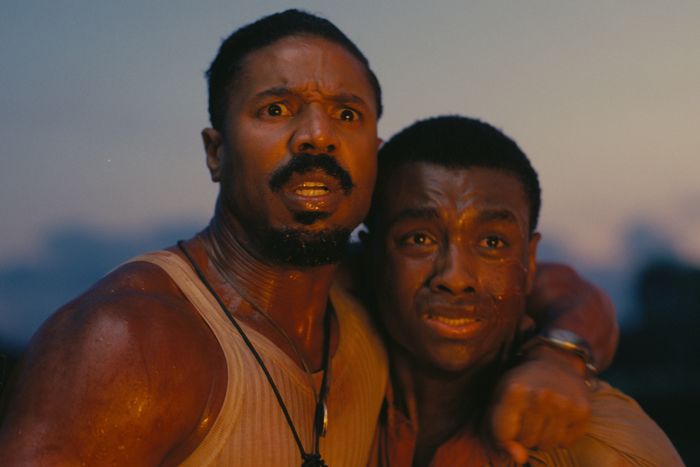Hollywood Execs Fear Ryan Coogler’s
By
Chris Lee, a Vulture senior reporter who covers Hollywood
3:00 P.M.
Studio executives around town are sweating over Warner Bros.’ unusual agreement with the director, saying it sets a “dangerous” precedent. Photo: Warner Bros.
The script for
Sinners began circulating among studios in Hollywood in the winter of 2023 and resulted in a bidding war by January last year: a wild drama-thriller
cum survival-horror flick set in Jim Crow–era Mississippi featuring blues-music set pieces, steamy sex scenes, Deep South occultism and dozens of Riverdancing vampires. More central to the project’s commercial potential, it had been written, and would be directed, by
Ryan Coogler — the creative force behind Marvel’s $1.4 billion–grossing
Black Panther — and star his frequent filmic muse
Michael B. Jordan in a dual role as identical-twin gangsters turned juke-joint-owner brothers named Smoke and Stack. As one studio after another began clamoring to pay
Sinners’s $90 million-ish asking price, the director’s agents at WME notified them of a few strings attached. Coogler would retain final cut (a creative dispensation reserved for the industry’s crème de la crème), command first-dollar gross (that is, a percentage of box-office revenue beginning from the movie’s theatrical opening rather than waiting for the studio to turn a profit), and, most contentiously, 25 years after its release, ownership of
Sinners would revert to the director.
That last part was a dealbreaker for most studios — Quentin Tarantino is the most recent on a very short list of auteurs to demand such an exceedingly rare rights-reversion agreement. In 2017, the multiple-Oscar winner negotiated a
complex pact with Sony under which copyright-control rights to his
Once Upon a Time in Hollywood would revert from the studio to Tarantino 30 years after its theatrical release. And while Sony and Universal had been in hot pursuit of
Sinners, Warner Bros. co-chairmen/CEOs Pam Abdy and Michael DeLuca were the only back-lot chieftains willing to acquiesce to Coogler’s unusual terms.
Directors owning their own movies is the opposite of business as usual — and to studios, cause for freaking out. According to senior executives at rival studios, the
Sinners deal sets a “very dangerous” precedent. “It could be the end of the studio system,” says one exec.
Specifically, they say Coogler’s agreement is already recalibrating filmmakers’ expectations surrounding copyright ownership and distribution entitlements, restructuring a time-honored industry power balance and effectively imperiling the cinematic back catalogue: the core asset behind all movie-studio valuation. “Studios exist for one simple reason: to build a library,” this executive continues. “The lifetime, long-term value of our film properties is what makes a studio a studio. It’s why David Ellison wants to
buy Paramount. It’s how
MGM sold for $8 billion. Things like licensing and windowing these films throw off hundreds and hundreds of millions of dollars a year globally. So the whole idea of building up your library — and you lose it in 25 years? Wait a second, you just gave up all your revenue down the line.”
Another executive at a different studio future-trips the consequences of Coogler’s deal in terms of making already fraught talent relationships even more difficult: by giving A-list directors unrealistic expectations. “If we, as a studio, give that to [Coogler], when somebody else we really want to be in business says, ‘Hey, I want this deal too’ — and you say, ‘No, I only gave it to him’ — how can we expect them to work with us?” he says. “It’s bad for the business. It’s bad for filmmaking relationships.”
In a
recent interview, Coogler — whose short but impactful film résumé includes the Sundance breakout biopic
Fruitvale Station,
Black Panther (nominated for a 2019 Best Picture Oscar), the
Rocky franchise spinoff
Creed, and
Black Panther: Wakanda Forever — described the symbolic importance of himself as a Black director owning a film about Black ownership. “That was the only motivation,” he said of pursuing the rights-reversion deal. (A publicist for Coogler declined to make him available for an interview with Vulture.)
By several insider accounts, Warner Bros. approached the deal calculus from a defensive crouch. In 2020, during the depths of the pandemic, the Burbank-based studio shocked and
infuriated its top-tier stable of filmmakers by announcing it would release its entire 2021 slate of theatrical films on its streaming service (then known as HBO Max) at the same time as in theaters. In response, the acclaimed director of Warner’s $165 million sci-fi epic
Dune, Denis Villeneuve, wrote that “Warner Bros. might have just killed the
Dune franchise” in an op-ed essay for
Variety. The studio’s longtime box-office rainmaker Christopher Nolan, meanwhile, decamped to Universal to make his next billion-dollar movie,
Oppenheimer. (Warner Bros. declined to comment for this story.)
Hollywood veterans as both producers and former co-chiefs of the film division at MGM, DeLuca and Abdy are renowned for their deep relationships with visionary moviemakers and long connection to prestige moviedom. Hired by Warner Bros. Discovery’s
movie-killing, “not artist friendly but artist aware and adjacent” CEO,
David Zaslav, to revitalize Warner Bros. in 2022, the duo’s mandate included remedying the studio’s ugly reputation around town for sacrificing talent to the bottom line. Abdy and DeLuca quickly made their mark green-lighting big-budget projects for a stable of esteemed, if not consistently bankable, auteurs: $130 million for Paul Thomas Anderson’s
One Battle After Another (a crime thriller starring Leonardo DiCaprio), $80 million for Maggie Gyllenhaal’s
The Bride! (reportedly a punk-rock art-house revision of
The Bride of Frankenstein), $80 million for
Saltburn writer-director Emerald Fennell’s adaptation of
Wuthering Heights, and, of course, Coogler’s
Sinners.





 nikkas is stupid.
nikkas is stupid.
